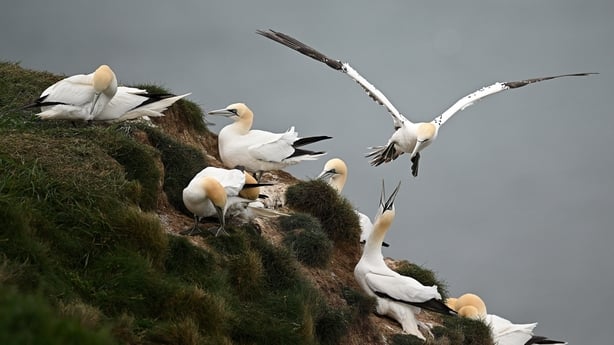Members of the public are being advised not to touch sick or dead wild birds following confirmation of a number of cases of avian influenza.
More commonly known as bird flu, avian influenza is a highly contagious viral disease affecting the respiratory, digestive and nervous system of many species of bird.
It can pose a threat to people and other animals in some circumstances, but these types of infections are rare and the risk to public health is considered to be very low.
Properly cooked poultry meat and eggs do not pose any food safety risk.
The Department of Agriculture, Food and the Marine, along with the Health Service Executive's Public Health Department, are seeking to highlight important safety information about bird flu, which has been detected in about 60 wild sea birds at a number of locations around the country.
All keepers of poultry and captive birds are being encouraged to implement stringent biosecurity measures to mitigate the risk of the disease spreading.
Poultry farmers and those who keep game birds or pets are advised to make themselves familiar with the signs of bird flu, and to closely monitor their birds for signs of the disease.
Members of the public are being advised not to touch sick or dead wild birds, and to report any suspected cases to their local regional veterinary office or to the Department of Agriculture, Food and the Marine at 01 492 8026.
Pets should be kept away from wild birds or should be kept on a leash in areas that wild birds frequent.

Dr June Fanning, Deputy Chief Veterinary Officer at the Department of Agriculture Food and the Marine, said it is "vital" that poultry owners and keepers of captive birds "maintain the highest standards of biosecurity to protect their birds".
"Avian Influenza is highly infectious to birds. Anyone travelling from an area known or suspected to be affected with avian influenza or where wild birds have been found dead should not come into contact with poultry or captive birds without prior cleaning and disinfection of clothing and footwear," she said.
"Strict biosecurity remains the number one preventative measure to the introduction of avian influenza into poultry and captive bird flocks."
Dr Keith Ian Quintyne, Consultant in Public Health Medicine with the HSE, said it is important that people do not touch potentially infected sick or dead wild birds.
He urged people to follow the guidance if they come across a sick or dead bird.
"To date, no human cases of infection have been reported in Ireland or the EU," he said.
"Even though the risk to human health is very low, human cases are reported periodically from China, and the UK has recently identified a single human case of avian influenza. Where human disease has occurred, it has tended to be mild.
"However, elderly people and vulnerable patients living with immunosuppression could be at greater risk of developing more severe disease."
Read more:
Department confirms several cases of avian influenza in wild birds
Reports of dead and dying seabirds on east and south coasts
What should I do if I find a dead wild bird?
While there have been large numbers of wild seabirds detected with Avian Influenza A (H5N1) around the coast, it is important to remember that the vast majority of wild bird deaths in Ireland will not be related to Avian Influenza, based on information from surveillance activities.
However, routine precautions should be followed to prevent any other health risks.
-Do not pick up or touch sick, dying or dead poultry or wild birds, and keep any pets away from them
-Avoid contact with surfaces contaminated with bird faeces
-Avoid untreated bird feathers (such as those found in the environment) and other bird waste
-Maintain good personal hygiene with regular hand washing with soap and use of alcohol-based hand rubs
-Dead waterfowl, such as ducks, geese or swans, or other dead wild birds, can be reported to the Department of Agriculture, Food, and the Marine at 01 492 8026.

